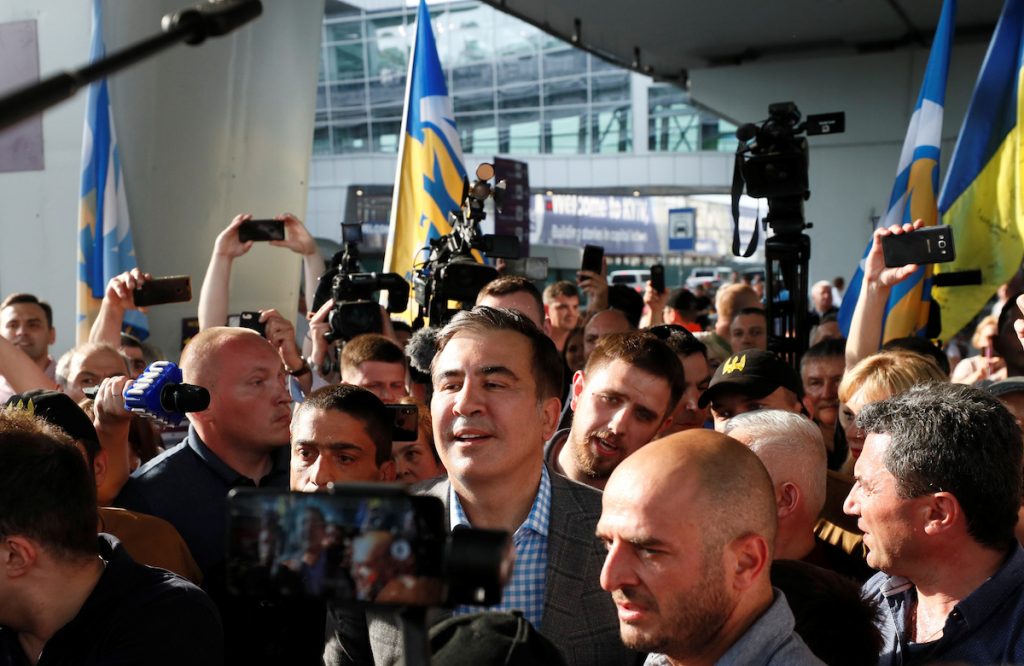“Get ready, hucksters” : Saakashvili appointed to official position in Ukraine
Ukrainian President Vladimir Zelensky signed a decree appointing former Georgian President Mikheil Saakashvili as head of the Executive Committee of the presidential National Reform Council.
“I sincerely congratulate Mikheil Saakashvili on this new challenge. I believe that he will be able to give impetus to the National Council of Reforms and will help implement important changes in the country,” reported Ukrainian news agency Hromadske, quoting the president’s statement circulated by his press service.
What is the Reform Council and what is Saakashvili’s role?
The same presidential decree states that the Council consists of the chairman of the Verkhovna Rada (the Supreme Council of Ukraine), the prime minister, some members of the government and the head of the National Bank, as well as the secretary of the National Security and Defense Council and the head of the Presidential Office.
- Georgian experts on gov’t react to appointment of ex-pres. Saakashvili as Ukrainian deputy PM: ‘silly and shameful’
- Op-ed: the third coming of Saakashvili to Ukraine
- Saakashvili publishes a teaser trailer for his film about Ukraine
The National Council of Reforms is an advisory body under the President of Ukraine, created under the previous President Petro Poroshenko in 2014. Its goal is to “introduce a coherent state reform policy in Ukraine.”
The council held a total of 28 meetings, at which various reforms were discussed. The last meeting was held on March 2, 2018 and it has not convened since then.
Zelensky’s decree spells out the functions of the head of the executive committee, that is, Saakashvili’s new job.
True, as Hromadske writes, “it is actually difficult to understand what functions, tasks and powers Saakashvili will have. Obviously, he will not have any instruments of power, since the committee is just an advisory body.”
Saakashvili’s return to Ukrainian politics
Under Poroshenko, the last Ukrainian president, Saakashvili was given Ukrainian citizenship, appointed adviser to the president, and later governor of the Odessa region. He then resigned, accused the authorities of corruption and tried to organize protests.
“Hucksters” is the term Saakashvili used to describe his opponents at the time – corrupt officials and defenders of the oligarchic system in the country.
After that, the former president of Georgia was deprived of Ukrainian citizenship and expelled from the country.
Saakashvili was only able to return to Ukraine after a change of power in 2019. President Zelensky restored his citizenship by decree.

Almost a year later, in April 2020, Mikheil Saakashvili was nominated to the post of Deputy Prime Minister for Reform by President Zelensky. However, after several meetings with deputies, his candidacy was not submitted to a vote. Media reports say that Saakashvili was not able to obtain the support of a sufficient number of deputies.
In its April 24 publication, “Get ready, hucksters: Saakashvili’s return to Ukrainian politics,” Hromadske tried to figure out exactly what is behind the second coming of “Miho” (as Saakashvili is called in Ukraine) and why Zelensky needs Saakashvili.
“He’s dealing with a staff shortage,” explains political analyst Vladimir Fesenko. And Zelensky himself actually admitted this when he announced that he is looking for effective executives.
“He’s a very powerful figure: he has experience and a history of successful reforms in Georgia, a powerful energy, political experience, international connections. But the most important thing for Zelensky is successful experience and an energetic nature,” said Fesenko, describing the merits of the potential deputy prime minister.
Political strategist Sergei Gaidai agrees with the opinion of that Zelensky has a “staff shortage,” even going so far as to call it a “managerial crisis,” which can be seen in the endless turnover of government officials since Zelensky’s Servant of the People Party came into power last year.
Zelensky decided to abandon his policy of finding exclusively “new faces” and began to look for people with experience, says Fesenko.
“The need for a new, strong driving force is obvious—earlier for reforms, now for crisis management,” said the political scientist.
During discussions on the candidacy of the former Georgian president for the post of deputy prime minister, Ukrainian experts noted the risks of conflicts between Saakashvili and current cabinet members.
Fesenko says that some members of the president’s team were afraid of a repeat of the situation with Poroshenko when Saakashvili turned from an ally into a fierce critic of the president.
The most obvious conflict risk is with the Minister of the Interior Arsen Avakov, with whom Saakashvili had a shouting match.
Sergei Gaidai considers conflict with Saakashvili inevitable.
“He is intolerant of corruption, intolerant of the failure, one can say it’s part of his worldview. This means an imminent conflict, at least with the government and Zelensky’s entourage,” said the political strategist.
The current Georgian authorities are opposed to the possible appointment of Mikheil Saakashvili to an official post in Ukraine. Tbilisi representatives say that appointing a person to the Ukrainian government who has been convicted on several charges in Georgia is unacceptable.
To learn more about how Saakashvili came to power in Georgia and his main achievements, see the JAMnews article Six things about Saakashvili you wanted to ask Georgians.




















